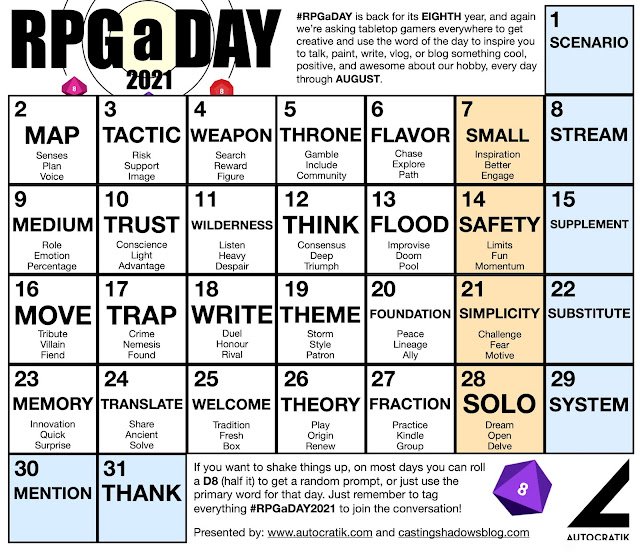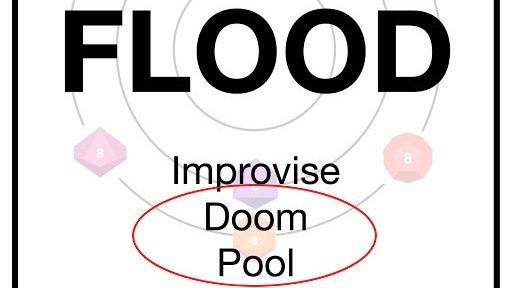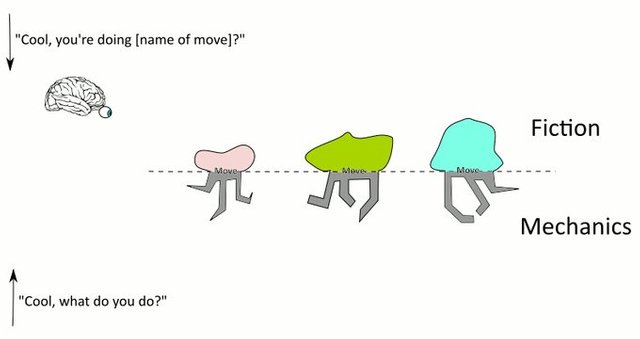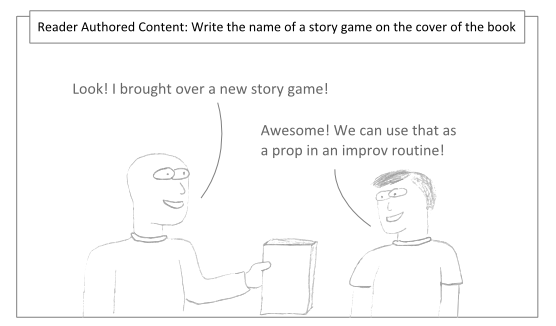My tweets for the tabletop RPG hashtag activity RPGaDay2021
During the month of August I've been posting some tabletop-RPG-related thoughts to twitter as prompted by the #RPGaDay2021 hashtag activity. I thought I would collect and repost them here, since twitter is so ephemeral.
Aug 1 I decided to try to make some videos for this year's #RPGaDay2021 prompts. Today's is "Scenario" so I talked a bit about how I want to adapt a scenario I made for an old design contest into something for #MosaicStrict but haven't figured out how to do yet.
Aug 2 The prompt for day 2 of #RPGaDay2021 is "Map", so I said to myself, "Is there a way I can twist this prompt to justify talking about RPG Theory?" #TTRPG #RPGTheory
Aug 4 My game Rusty from Disuse involves playing out an anthology of stories as a particular weapon passes through the lives of different owners, so it seems appropriate to mention on Weapon day of #RPGaDay2021
The game originated in the Threeforged design contest, so the premise wasn't mine, but I tried to give it a system that supported the idea. There are three rotating roles, the World (a GMish role), the Wielder (similar to a normal RPG player role), and the Weapon. ...
The Weapon role isn't about roleplaying the weapon as a character, but they're there to suggest courses of action to the Wielder player, essentially making "backseating" into an intentional element of the game. But they have to do it from a focused "use the weapon" perspective.
I thought this would be a way to keep the temptation to violence as an interesting and weighty element of the stories. In an anthology of stories about a weapon influencing the lives of different people that seemed like an important thematic element.
For a while I thought that I'd need an art budget to publish it, since weapon illustrations are a mainstay of RPGs. But one day I saw @PaulCzege tweet about the Metropolitan Museum of Art making photographs of their collections public domain, and how this could be cool for RPGs.
And I realized they had historical weapons in their collection, so I shifted my thinking from "I can't develop this since I can't afford art" to "Do I have the skills to make something that looks good enough if I use museum photos as the basis?".
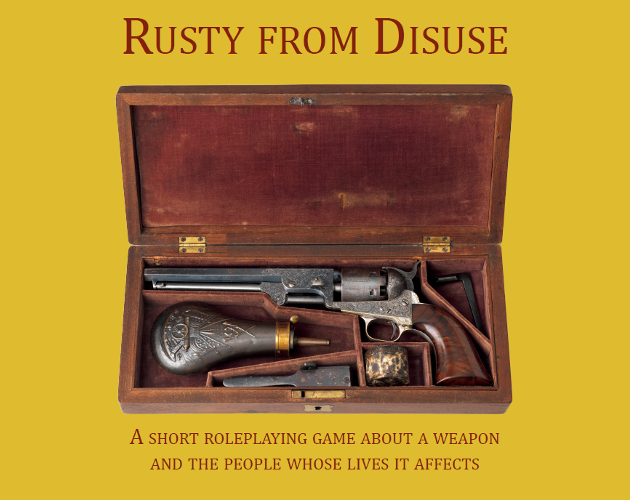
https://gamemaru.itch.io/rusty-from-disuse
Aug 6 Years ago I was planning to do a deep dive on Forge Theory terminology to see what was/wasn't worth caring about. Never got further than Currency (which I concluded was redundant), but in the process I gained a new appreciation about relationship between Position and Exploration.
I tried to express that in a fun way for the video I made for day 2 of #RPGaDay2021, but an alternate theme for day 6 is "Explore", so it seems a valid excuse to repost my video.
Aug 7 It's difficult to design short, small TTRPGs. I think sometimes there's a temptation to embrace the illusion of brevity or simplicity, such as by stealth-incorporating other games. That's the foundation of the humor in one of my 200word RPGs: https://200wordrpg.github.io/2017/rpg/2017/04/15/WittgensteinsMonster.html #RPGaDay2021
The conceit here is that it seems totally legit to use a component like "dice" or "a deck of cards", so if I just as casually say "the text of another RPG" I can have my allegedly 200-word RPG contain more than it can actually contain in its 200-word text.
Because I mostly engage with extremely short RPG texts in contests, etc., I'm more likely to use them as a basis for humor or satire rather than as something I genuinely expect people to play. For a playable RPG I tend to think "as short as possible" is not a great constraint.
Aug 8 I've considering doing a podcast or stream show about TTRPG stuff, but it's tough as a solo act and not sure how to make it sustainable. For example, hosted a roundtable about Threeforged, good discussion, but my well is dry for other topics. #RPGaDay2021
Aug 9 I made a video about Heartfelt, my optional TTRPG subsystem for social interactions that uses emotions as the foundation for the mechanics. I talk about being inspired by DitV's dice system, @fuseboy's #MosaicStrict, and the DBT emotion model. #RPGaDay2021
Aug 10 Trust is an important factor in TTRPGs because it's important to all human interactions. Unfortunately the untrustworthy people of the world know that it's beneficial to them if they can't be distinguished from the trustworthy, so they make it hard for people. #RPGaDay2021
Trust isn't just a factor w/ people, it's part of our relationship w/ games, too. Do you "trust" a new game to be good, or just stick with what you already know? Often we can't judge directly, so we try to infer from secondary factors: designer reputation, production values, etc.
Relying on those secondary factors is a dubious proposition at best, but it's not really clear what the alternative is: It's not practical to read and play every game to judge it independently on its own merits.
Aug 11 The TTRPG I've played with "wilderness" as the biggest factor was Mouse Guard. Before I played MG I wasn't familiar with the setting, but the play experience convinced me that looking at the outdoors from a mouse-sized POV is a great setting for gritty heroism. #RPGaDay2021
Aug 12 The Think prompt of #RPGaDay2021 seems like an invitation to discuss Cogito - unrestrAIned, which was a game I contributed to for the #Threeforged2019 jam. The Cogito in the title is a reference to Descartes' "Cogito ergo sum", "I think therefore I am"
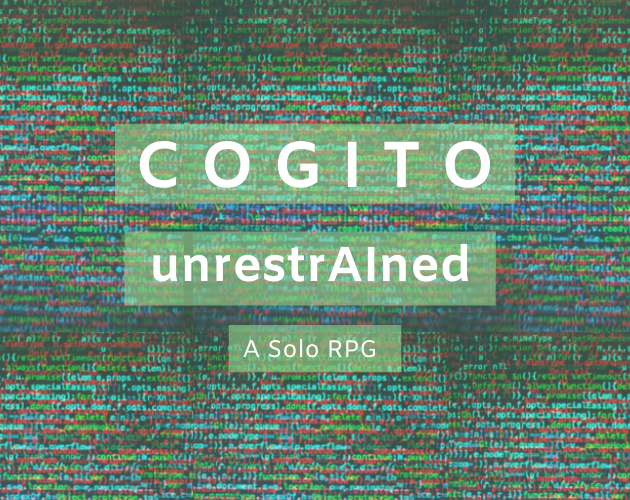
Cogito - urestrAIned
Some people seem to believe "I think therefore I am" means something like "Thinking is important to me", but really it's part of a logical proof: If thinking is happening, something must exist that's doing the thinking, therefore I exist. Seemed apropos for game about being an AI
I had what I think is a good Threeforged experience with the game: when I first got what was handed to me I didn't like it and thought it was a dubious idea. Then I had to reframe my POV to find what was good and worth exploring about the idea, and stretch myself to ...
give that idea the best support I could think of. In this case, a solo RPG that doesn't say "act like a stereotypical AI character" but just tries to put you in a "driver's seat" where you've been told what to do but not necessarily who to be.
I probably wouldn't have done some of the things I did in my phase of this project if it wasn't collaborative. And in an active collaboration I might have been inclined to shoot down the idea. Instead I did my best to try to honor an idea I wasn't initially on board with.
Aug 13 Speaking of the doom pool, I enjoyed the Marvel Heroic Roleplaying Game quite a bit. While I had some minor issues with the game system, overall I thought it was fun as a game and did some interesting design stuff. #RPGaDay2021
However, I think there were issues with it as a TTRPG product. The PDFs were very expensive, and I found the art pretty lifeless and flat. I think much of that was due to the licensing, and they had access to Marvel comic book art but only the more modern stuff with its style.
And the license deal and product line eventually collapsed, presumably because it wasn't bringing in the kind of $ to justify oversight of the contract (if I had IP bringing in billions via movies I probably wouldn't be able to justify effort to keep track of a TTRPG either).
Aug 14 Seems like an popular opinion in the indie TTRPG scene, but I have been skeptical of the "safety tool" thing in RPG land, especially as implemented with stuff like the X card. Seems questionable that the design achieves the alleged intent, and may have downsides. #RPGaDay2021
I've never played with them so I can't speak from personal experience, but from my POV I feel "safer" when I know what I can expect, e.g. Everyone following rules?, We're on same page about genre?, etc., not when there's an extra weird, unpredictable social layer bolted on top.
Personally I'm not really into pushing boundaries, but for people who are into exploring more challenging stuff it seems like the better Forge solution of adopting a humane "I will not abandon you" approach got tossed overboard for a worse solution that had better marketing.
Aug 16 There's a "neat, plausible, and wrong" idea of how PbtA moves work, which is that players should ideally only communicate via fictional description, never in mechanical terms. AW itself says this is wrong: both mechanical and fictional sides of moves are important. #RPGaDay2021
The idea that talking in mechanical terms is somehow tawdry or distasteful is consistent with the "training wheels" or "rocket gantry" model of RPG rules where the mechanics "fall away" once you achieve True Roleplaying. But AW (and most descendants) aren't built like that.
A few years ago I wrote a long blog post about this (discussion in the comments prompted me to create the gif above to illustrate the dynamic equilibrium advantages of being able to care more about the fictional or mechanical aspects at different times).
https://steemit.com/gaming/@danmaruschak/in-apocalypse-world-not-speaking-the-name-of-your-move-is-a-rule-for-gms-not-players
Aug 17 I haven't played too many TTRPGs where traps are a factor, and not many crime-oriented ones either, so I was drawing a blank about what to post about for #RPGaDay2021 day 17, but then I remembered I wrote "Real Artists Steal" for a not-a-game jam.
With this one I was partly trying to make a philosophical point about the nature of games (specifically, something with the form of a game won't feel gamelike if the individual elements feel TOO meaningful and stretch outside the "magic circle") ...
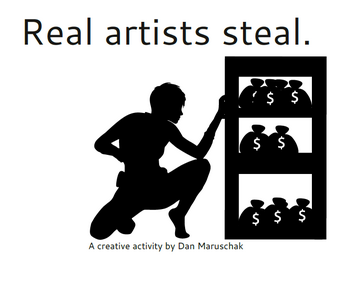
Real artists steal
and partly trying to make a jokey observation about the indie RPG scene. So the form of this thing is a heist game which a gimmicky resolution mechanic. But the "twist" is that the resolution mechanic is asking other people to collaborate on designing an RPG with you.
The element that joins the observation and philosophical point together is that asking people to make an RPG with you seems big, like something you'd only do with people you know and trust, not something light and casual. So this is a non-game because making a game is meaningful.
Aug 18 I would like to do more TTRPG writing and design stuff, but it's often a struggle to find motivation when it feels like so much of what I've already done has been talking into the void. #RPGaDay2021
Jul 29, 2020 The Void, a #OneTweetRPG
- You are The Void.
- Find a tweet that has gotten little or no response or reaction.
- Read it with empathy, compassion, and an open mind.
- Contemplate the tweet for at least one minute as you absorb it into your boundless depths.
- Don't respond.
Aug 21 The simplicity of a TTRPG is really hard to judge. I'm not aware of any objective measure, so most of us use intuitive proxies, like "how difficult will it be to learn?". But this leads to things like "familar" seeming "simple". #RPGaDay2021
This phenomenon leads to almost every "beginner friendly" or "kid friendly" RPG being a rule-light stat+roll vs TN system because it's easy for most vetern RPGers to absorb a game like that. But that's because they have a lot of tacit knowledge about how games like that work!
When do you call for a roll? What's a single task vs. something that should be broken up into multiple rolls? What are reasonable expectations for success or failure? If you have a lot of built-up intuitions that answer these questions you may not see the complexity in them.
Things like length or style can also skew the perceptions. It would be difficult to absorb all the information in an encyclopedia, but in form that's a much simpler book than, say, a novel with out-of-order storytelling or an unreliable narrator.
When the indie RPG scene was more anarchic and experimental in trying different approaches I had hoped it might be a way to get a better understanding of what truly makes a complex or simple RPG, as lots of different experiments would be tried.
However, it seems to me that the siren-song of "you already know how to play!" marketing has led to the popularity of "hacks" in the indie RPG scene, and experimenting with novel approaches is rarer than I expected back in the day.
Aug 24 One thing I've found interesting about designing subsystems for TTRPGs under the #MosaicStrict constraints is figuring out how to share space with subsystems that may not exist yet. I try avoid stepping into spaces where I think another system might want to be. #RPGaDay2021
Aug 25 Maybe projecting my own preferences, but I think the best way to welcome more people into the TTRPG hobby is to make more games that are reliably fun and learnable from the rules text. If people have to absorb a culture before they can have fun then it's a barrier. #RPGaDay2021
Aug 26 The most enduring element of Forge-era TTRPG Theory is the lumpley principle: "System (including but not limited to 'the rules') is defined as the means by which the group agrees to imagined events during play." #RPGaDay2021
It's possible to interpret this in so broad an "everything is everything" way that it seems to say nothing, or to jump to thinking that System is about parceling out authority or working out a framework of negotiations. ...
A subtler point is to notice that people agree when they encounter something that seems true or right. So game design is about both causing people to encounter things, and creating conditions such that it seems right to accept them.
Formal rules can be a big part of that, if you agree that the rules apply then it's likely you'll accept the result of the rules. But there are subtleties and nuances.
e.g., Negative consequences of falling into an old-style deathtrap in a dungeon feel more acceptable if dungeon is from published adventure vs. something a GM is making up on the fly. In a published adventure it feels like "it was already there", not something GM is doing to you.
e.g. A game presents a loaded question like "How was your character betrayed by a friend in the past?" that seems more acceptable than the rules just declaring "Your character was betrayed by a friend in the past", even if they're functionally very similar.
Things like theme, tone, setting design, what the rules do or don't emphasize, etc., all contribute to the psychological landscape of what will or won't feel acceptable. And mechanics are a good way to get content into a game that players wouldn't have come up with on their own.
Also, consistent w/ Vincent Baker's recent blog post about RPG Essentialism, this isn't true about RPGs because RPGs are special, this is true because this is how all games work. Sports, e.g., include both the formal rules and the physical realities of what it means to play them.
Aug 27 Seems the conventional wisdom in TTRPG discussion space is you need lots of eyeballs on your stuff, because only a fraction of them will engage, and only a fraction of them will engage meaningfully, and so on. Not clear this works well, but unsure of alternatives. #RPGaDay2021
Aug 28 Back in the Forge / S-G days I got entangled with the dream that I could be a successful indie RPG designer. I thought "I can probably design a better-than-average RPG". But it's hard to pull off the "successful" part as a solo act. #RPGaDay2021
I have ambivalent feelings abt TTRPG design. On one hand it's the art form that I feel most connected to & making art is good for the soul. On the other hand, the cycle of convincing myself "maybe world isn't so hostile" but then feeling like the hostility is confirmed is tough.
Aug 29 The original "System Matters" was a descriptive claim, that the formal rules will inevitably influence play in some way. I tend to go a step further to the prescriptive claim: you're better off following the rules and letting each game be it's own unique experience. #RPGaDay2021
The high-minded argument is akin to being able to appreciate a variety of foods: it's better aesthetically (and probably nutritionally) to be able to consume a variety of dishes rather than trying to turn everything into a smoothie.
Personally, I also find it emotionally exhausting to have to try to continually convince people to play the game they ostensibly agreed to play. I find the various flavors of "system doesn't matter" that take over communities to be pernicious and alienating.
In the mainstream space that's usually things like dice-fudging and GMs modifying rules on-the-fly. That's not the only flavor, though, e.g. before I gave up on Story-Games it seemed like "improv" (as in the type of acting performance) was becoming the de facto model for RPGs.
In my more cynical moments I think this trend is a microcosm of the larger world: Narcissists and people who want to bask in the reflected glory thereof want to make the rest of us feel like we're selfishly asking for special favors when we want to use systems that work.
My impression that few people take a hardcore system matters approach creates a big barrier for me to trying to play more: not only would I have to convince people to want to play with me, I'd have to convince them to play by the rules. And I suck at convincing people!
Aug 31 There's an idea in the indie TTRPG space that it's very important to cite your influences. My contrarian streak makes me wonder who it serves to have the already-influential constantly mentioned and thanked. Is academia really so great that we need to copy this part? #RPGaDay2021
